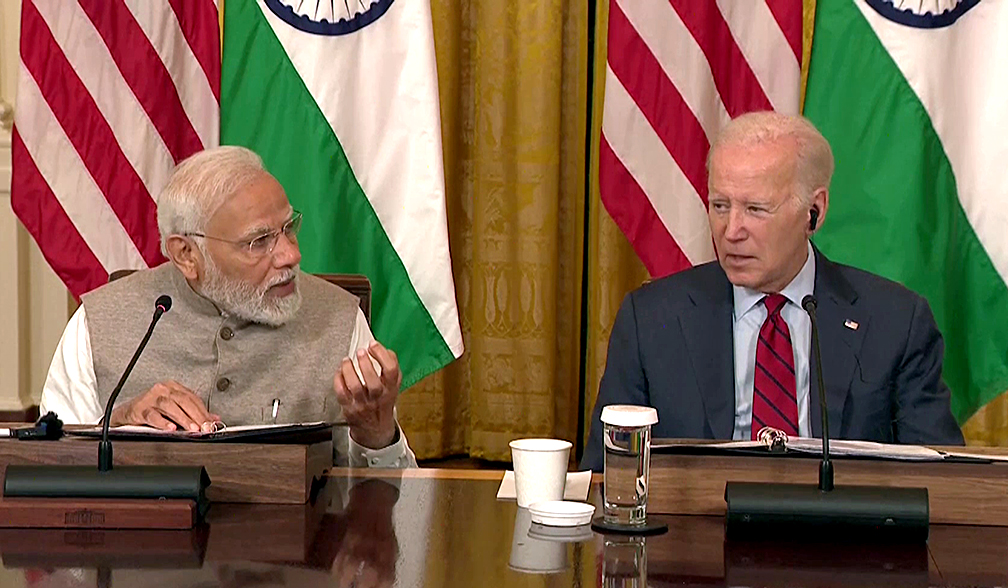In its reaction about a host of defence and commercial agreements during Prime Minister Narendra Modi’s State visit to Washington last week, China called upon “relevant countries” to act in ways “conducive to mutual trust” in the region. Chinese Foreign Ministry spokesperson Mao Ning told a media briefing in Beijing on Monday, “We hope relevant countries will act in ways conducive to mutual trust between regional countries in the field of security and stability in the region.” She also said that cooperation between countries should not undermine regional peace and stability and target any third party. But China’s appeal for “mutual trust” is really preposterous, given its own past records full of instances of Beijing’s breach of trust in every global quarter. Similarly, the Chinese spokesperson’s appeal to India and the US for not “undermining regional peace and stability and targeting the third party” is also laughable. No responsible country in the world can take the Chinese spokesperson’s remarks seriously. Chinese aggressive actions in the Indo-Pacific, South China Sea region, and at the Line of Actual Control (LAC) with India are contradictory to whatever was said by the spokesperson in Beijing. Has China ever observed respect for foundational principles and regimes like UNCLOS which are essential for the credibility of the global order? The international community is aware that China violated the international laws, immensely damaging the “mutual trust” which Beijing is now laying emphasis on. While officials at South Block dismissed Chinese concerns over the GE-HALF-414 jet engine agreement by saying that the deal was a progressive evolution of India-US defence cooperation over the past two decades and had little to do with Beijing or regional security, Prime Minister Narendra Modi and US President Joe Biden were right in emphasising the rules-based international order, saying “the contemporary global order has been built on principles of the UN Charter, international law, and respect for sovereignty and territorial integrity of states”. They were again bang right in reiterating their enduring commitment to a “free, open, inclusive, peaceful, and prosperous India-Pacific region with respect for territorial integrity and sovereignty, and international law.” As a matter of fact, these are the principles that promote mutual trust which is conducive to global peace and proper world order. With China in the habit of violating the global legal framework more often than not, Beijing’s irritation at the India-US joint statement and agreements is understandable. External Affairs Minister S. Jaishankar has on many occasions slammed China for “disregarding” the “written agreements” with India on not amassing troops at the border. Are these remarks not enough for exposing China as an unreliable and untrustworthy country? That Beijing has been hobnobbing with Pakistan in a bid to foment trouble for India. India has on several occasions called out attempts by Pakistan and China to disrupt peace along the northern and western frontiers. China is hell bent upon extending the CPEC project to a third country like Afghanistan despite India’s objections and protests. Going back to 2020, in an indictment of China’s Covid policy, the WHO had said that Beijing needed to share more data on its Covid outbreak. The World Health Organisation had said that the Chinese authorities were underreporting Covid deaths. Therefore, credibility and reliability of China was seriously under question at the time of pandemic when the entire world was combating the menace. So, there is no dearth of examples to establish that China never cares for mutual trust. Similarly, there are scores of incidents and examples to show that Beijing has been expanding its cooperation with Islamabad and some other like-minded neighbouring nations in a bid to target India. So, it is just ridiculous that Beijing is urging that the cooperation between countries should not undermine peace and stability and target any third party. This is not, however, the case in terms of bilateral ties between India and the US.
The joint statement issued by India and the US does not at all imply anywhere that the US-India bilateral cooperation is going to target any third party. The agreement only re-emphasised the need for the world to create an atmosphere which is conducive to promoting mutual trust and peace. Definitely, China is not contributing to the process of strengthening the global ecosystem where mutual trust, and peace and stability prevail. With this in view, China was obviously an elephant in the room during PM Modi’s talks with Biden.
T. BRAJESH





